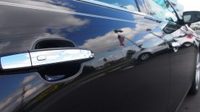NATICK, MA--July 9, 2013: MathWorks today announced that University of Victoria has won the MathWorks modeling award as part of the EcoCAR 2 student competition. The award recognizes the team's use of MATLAB and Simulink for Model-Based Design during the three-year competition to reengineer a 2013 Chevrolet Malibu to improve its fuel efficiency. Other schools to place included Ohio State University and Mississippi State University, winning second and third place respectively.
“These competitions also give students real-world engineering experience with the hardware and software used in professional environments. MathWorks was very impressed with the enthusiasm and professionalism of the student presenters.”
Eleven EcoCAR 2 teams participated in the MathWorks Modeling Award competition. The teams demonstrated their innovative use of modeling and simulation through a presentation and Q&A session coinciding with the end of Year Two of the three-year challenge. Winners were assessed on how well they applied Model-Based Design concepts using MathWorks tools, including the key areas of plant modeling, control design and tuning, data analysis, industrial grade Model-Based Design development process elements, and lessons learned.
"Student competitions are a great way to inspire our next generation of engineers while giving them an appreciation for working toward greater causes," said Paul Smith, Director, Consulting Services Group, MathWorks. "These competitions also give students real-world engineering experience with the hardware and software used in professional environments. MathWorks was very impressed with the enthusiasm and professionalism of the student presenters."
Video: What does Model-Based Design mean to you?
EcoCAR 2 Ohio State University team used Model-Based design to increase quality and reduce development time.
Video: Productivity using MATLAB and Simulink
Colorado State University's EcoCAR 2 team improved productivity by using simulation to test and validate models.
To be eligible for the award, teams must be active participants in the 2013 EcoCAR 2 Challenge, a competition organized by the U.S. Department of Energy and General Motors. The teams use Model-Based Design, an approach in which a virtual model is at the center of system development, from initial design and simulation through to testing and implementation. The contestants used online and offline parallel optimization of fuel economy at the vehicle level.
About EcoCAR 2: Plugging In to the Future
EcoCAR 2: Plugging In to the Future is a three-year collegiate engineering program that builds on the successful 25-year history of Department of Energy advanced vehicle technology competitions by giving engineering students the chance to design and build advanced vehicles that demonstrate leading-edge, eco-friendly automotive technologies. General Motors provides each of the 15 competing teams with a 2013 Chevrolet Malibu, as well as vehicle components, seed money, technical mentoring and operational support. The U.S. Department of Energy and its research and development facility, Argonne National Laboratory, provide competition management, team evaluation and logistical support. Through this important public/private partnership, EcoCAR 2 provides invaluable experience and training to promising young minds entering the North American job market. EcoCAR 2 follows the widely acclaimed competition series EcoCAR: The NeXt Challenge.
MathWorks is the leading developer of mathematical computing software. MATLAB, the language of technical computing, is a programming environment for algorithm development, data analysis, visualization, and numeric computation. Simulink is a graphical environment for simulation and Model-Based Design of multidomain dynamic and embedded systems. Engineers and scientists worldwide rely on these product families to accelerate the pace of discovery, innovation, and development in automotive, aerospace, electronics, financial services, biotech-pharmaceutical, and other industries. MathWorks products are also fundamental teaching and research tools in the world's universities and learning institutions. Founded in 1984, MathWorks employs more than 2800 people in 15 countries, with headquarters in Natick, Massachusetts, USA.



